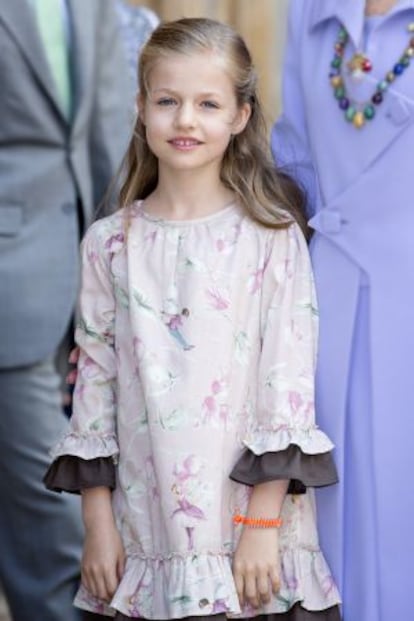Leonor becomes a crown princess
Felipe's eldest daughter has begun a low-key public life to prepare her for her future role

The explanations began on the day that Leonor de Borbón y Ortiz asked: “Why do people take so many pictures of us?”
That is when Felipe and Letizia told Leonor that her grandparents were the king and queen of Spain.
It was reportedly harder for her mother to answer the next question: “So what do you do for a living?” The reply was: “I work for Spain, to improve the country.”
And so at the age of eight, Leonor already knows that she is part of the royal family and that one day, she too will be queen of Spain.
On the day that her father becomes king, Leonor will become the heir to the throne and bear the title of Princess of Asturias. When she turns 18, she will swear to uphold the Spanish Constitution, as her father did before her.
Unlike other royal families in Europe, the Spanish monarchy still preserves an old law that favors male descendants over female ones in the line to the throne. This means that if a baby boy were born to Felipe and Letizia, he would skip ahead of his sisters to become the crown prince – unless the Constitution were to be changed.
But it seems unlikely that Letizia has any further plans for motherhood.
On May 2, when Juan Carlos’ decision to abdicate was still under wraps, Leonor attended her first official act at the San Javier airbase in Murcia. Her presence there was no coincidence. Sources at the royal residence, La Zarzuela, said that this marks the beginning of Leonor’s public life.
For now, though, her parents want her to keep a low profile. “She’ll have time enough for all of that,” said Don Felipe on one occasion.
But things are happening fast all of a sudden. Leonor is expected to be there at the ceremony that will turn her father into Felipe VI.
The infanta is about to finish the third grade at a secular private school, Nuestra Señora de los Rosales, where monthly student fees are €700. Leonor’s younger sister Sofía also attends this school.
They say that Leonor is an attentive student, who takes ballet lessons and is studying the history of the Bourbons, the dynasty to which she belongs. In future, she will receive some military training to prepare her for her role as chief of the armed forces. She is also expected to study abroad for a while, as her father did in Canada.
Eat your vegetables, they contain antioxidants”
Leonor to little sister Sofía
The royal palace will not provide any more details about plans for Leonor, insisting on the need to protect the child’s privacy as far as is possible.
Physically, Leonor is a lot like her grandmother, Queen Sofía, at the same age. She is an earnest child who likes to observe things around her and makes sure that her little sister is obedient at all times. In private she is said to be more restless and witty. A Spanish scientist once revealed a now-famous anecdote told to him by Letizia, in which Leonor said to her sister: “Eat your vegetables – they contain anti-oxidants.”
“They are very well-behaved little girls,” say sources at the palace who are in touch with the family on a daily basis. Just as Letizia places high demands on herself, she also places them on her children.
Nearly two years ago, King Juan Carlos expressed a desire to have his picture taken with his son and eldest granddaughter at the palace gardens. This photograph, which illustrates the family’s dynastic lineage, was there in the background when the king announced his abdication on Monday.
The youngest, Sofía, was reportedly jealous that she was not allowed to pose with “Grandpa.” In the end, Juan Carlos had another picture taken in which Sofía was included, but that shot remains in the family’s private photo album. The portrait of Spain’s future monarchy is clear.
Tu suscripción se está usando en otro dispositivo
¿Quieres añadir otro usuario a tu suscripción?
Si continúas leyendo en este dispositivo, no se podrá leer en el otro.
FlechaTu suscripción se está usando en otro dispositivo y solo puedes acceder a EL PAÍS desde un dispositivo a la vez.
Si quieres compartir tu cuenta, cambia tu suscripción a la modalidad Premium, así podrás añadir otro usuario. Cada uno accederá con su propia cuenta de email, lo que os permitirá personalizar vuestra experiencia en EL PAÍS.
¿Tienes una suscripción de empresa? Accede aquí para contratar más cuentas.
En el caso de no saber quién está usando tu cuenta, te recomendamos cambiar tu contraseña aquí.
Si decides continuar compartiendo tu cuenta, este mensaje se mostrará en tu dispositivo y en el de la otra persona que está usando tu cuenta de forma indefinida, afectando a tu experiencia de lectura. Puedes consultar aquí los términos y condiciones de la suscripción digital.









































